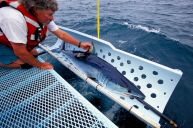Fishermen and scientists alike are shocked by the changing behaviors of these behemoth sharks. They've started popping up more than 180 miles away from their usual hunting grounds.
Now, they appear to be invading Washington more regularly. Researchers discovered 11 broadnose sevengill sharks as well as the soupfin species near Olympia. Previously, locals only ever spotted one of the broadnose sevengill in the region. That was way back in 1993. Flash forward to 2021, and a local fisherman pulled one out of the water and snapped a picture.
At first, the Washington State's Department of Fish and Wildlife planned to fine the fisherman. They thought it was a bluntnose sixgill shark. That fish is illegal to fish for due to it being so dangerous.
"I looked at the picture and said, 'This can't be right,'" said Dayv Lowry, a natural resources specialist with the National Oceanic and Atmospheric Administration in Olympia.
"We thought it was just a fluke," said Jessica Schulte, a PhD candidate in the Big Fish Lab at Oregon State University who studies sharks, also added.
Sharks Invade Washington
Schulte's team combined forces with Washington's Department of Fish and Wildlife and NOAA. They all went out looking for the shark species and managed to catch two in just two hours.
"When we saw it come up there was a lot of hooting and hollering," said Lowry. Schulte was surprise to see the fish. She said, "'What are you doing here?' There's been over 200 years of commercial fishing in the region and no one's ever seen one that far in."
However, that's not the only thing that shocked the research team. "The fisherman had also posted a photo of a soupfin shark, which is critically endangered," said Ethan Personius, a graduate student in Oregon State University's Big Fish Lab. "And we found them too."
"It's possible these sharks are moving into these areas to take advantage of favorable climate conditions and new prey resources," Personius said.
It appears that things are changing. "We scoured our records going back a hundred years and they were never recorded here beyond one validated sighting," said Lowry. "This species is now several hundred miles from where it's ever been documented."




